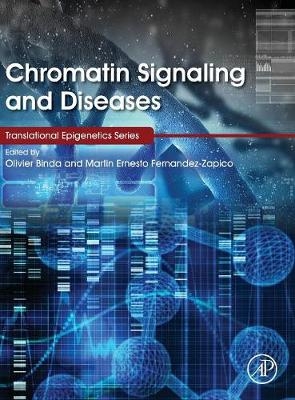
Chromatin Signaling and Diseases
Academic Press Inc (Verlag)
978-0-12-802389-1 (ISBN)
- Titel erscheint in neuer Auflage
- Artikel merken
After reading this book, clinicians will be more capable of explaining the mechanisms of gene expression regulation to their patients to reassure them about new drug developments that target chromatin signaling mechanisms. For example, several epigenetic drugs that act on chromatin signaling factors are in clinical trials or even approved for usage in cancer treatments, Alzheimer's, and Huntington's diseases. Other epigenetic drugs are in development to regulate various class of chromatin signaling factors. To keep up with this changing landscape, clinicians and doctors will need to stay familiar with genetic advances that translate to clinical practice, such as chromatin signaling.
Although sequencing of the human genome was completed over a decade ago and its structure investigated for nearly half a century, molecular mechanisms that regulate gene expression remain largely misunderstood. An emerging concept called chromatin signaling proposes that small protein domains recognize chemical modifications on the genome scaffolding histone proteins, facilitating the nucleation of enzymatic complexes at specific loci that then open up or shut down the access to genetic information, thereby regulating gene expression. The addition and removal of chemical modifications on histones, as well as the proteins that specifically recognize these, is reviewed in Chromatin Signaling and Diseases. Finally, the impact of gene expression defects associated with malfunctioning chromatin signaling is also explored.
Dr. Olivier Binda is a Researcher at the University of Ottawa, specializing in epigenetics and gene expression as it relates to human diseases. Dr. Binda co-edited Chromatin Signaling and Diseases (Elsevier 2016), a volume in Elsevier’s Translational Epigenetics series, and has published 20 scientific papers in such peer reviewed journals as the Molecular Cell, Journal of Biological Chemistry, Biochemistry, Epigenetics, Oncogene, Scientific Reports, and Stem Cell Research. In past positions he has served as a postdoctoral fellow at McGill University and Stanford University, and he completed his PhD in Biochemistry at McGill University in 2007. Affiliations and expertise University of Ottawa, Department of Cellular and Molecular Medicine, Ottawa, CANADA. The research program of Martin E. Fernandez-Zapico, M.D., focuses on the cellular and molecular characterization of epigenetic pathways regulating pancreatic carcinogenesis, a dismal disease with one of the poorest prognoses among all neoplasms. Specifically, Dr. Fernandez-Zapico and his team study the modulation of chromatin and nuclear dynamics by oncogenic cascades and its impact in gene expression regulation, a critical step during pancreatic neoplastic transformation.Dr. Fernandez-Zapico and his team are confident that the knowledge derived from his studies will help with the understanding of the contribution of these epigenetic events to the initiation and/or progression of pancreatic carcinogenesis as well as serve as a foundation for the development of new therapeutic approaches.Dr. Fernandez-Zapico's program is affiliated with the Mayo Clinic Cancer Center, Department of Oncology, Division of Gastroenterology and Hepatology, and the Center for Cell Signaling in Gastroenterology. His research is supported by the National Institutes of Health (NIH), the NIH-funded Mayo Clinic Pancreatic Cancer Specialized Program of Research Excellence (SPORE), the NIH-funded Mayo Clinic Center for Cell Signaling in Gastroenterology, and the Leukemia and Lymphoma Foundation.
Section I: Histone Mark Writers 1. Histone acetyltransferases, key writers of the epigenetic language Xiang-Jiao Yang
2. Impacts of histone lysine methylation on chromatin Sylvain Lanouette, John Haddad, Pamela Zhang and Jean-François Couture
3. The Role of Histone Mark Writers in Chromatin Signaling: Protein Arginine Methyltransferases Nasim Haghandish and Jocelyn Côté
4. Histone Kinases and Phosphatases Nikolaus A. Watson, Jonathan M.G. Higgins
Section II: Histone Mark Readers 5. The Bromodomain as Acetyl-Lysine Readers Steven G. Smith, and Ming-Ming Zhou
6. Chromo domain proteins Joel C. Eissenberg
7. The role of PHD fingers in chromatin signaling: mechanisms and functional consequences of the recognition of histone and non-histone targets Emma A. Morrison and Catherine A. Musselman
8. Tudor domains as methyl-lysine and methyl-arginine readers Maria Victoria Botuyan and Georges Mer
Section III: Histone Mark Erasers 9. Histone deacetylase, the erasers of the code María Julia Lamberti, Emanuel Renzo Vera, Natalia Rumie Vittar Belén, Güenter Schneider
10. Lysine Demethylases: Structure, Function and Disfunction María Alejandra García, Raquel Fueyo, and Marian A. Martínez-Balbás
Section IV: Chromatin Signaling 11. Variation, modification and reorganization of broken chromatin Timothy C. Humphrey, Jessica A. Downs, and Anna L. Chambers
12. Cross-talk between histone modifications integrates various signaling inputs to fine tune transcriptional output Sankari Nagarajan and Steven A. Johnsen
13. Signaling and Chromatin Networks in Cancer Biology Elisabeth Hessmann, Raul Urrutia, and Alexander Koenig
Section V: Chromatin Dynamics in Normal and Disease Conditions 14. Crosstalk between DNA methylation and Chromatin Structure María Roqué and Laura Vargas-Roig 15. Epigenetic regulation of endoplasmic reticulum stress Kim Barroso and Eric Chevet
16. Chromatin Signaling in Aging and Cellular Senescense Florence Couteau and Frédérick A. Mallette
17.Chromatin Dynamics and Epigenetics of Stem Cells and Stem-Like Cancer Cells Alexandre Gaspar-Maia and Ana Sevilla
18. Altered Chromatin Signaling in Cancer Andrew Liss
19. Impact of Chromatin Changes in Pathogenesis of Infectious Disease: A Pathogen View Andrea Ropolo and Maria Carolina Touz
20. Chromatin Remodeling and Epigenetic Reprogramming In Chronic Disease and Cancer in the Liver and Pancreas Maite G. Fernandez - Barrena and Christopher L. Pin
21. Pharmacological and Therapeutic Targeting of Epigenetic Regulators Raul Urrutia and Gwen A. Lomberk
22. Use of Chromatin Changes as Biomarkers Ryan A. Hlady and Keith D. Robertson
23. Regulation of Host Chromatin by Bacterial Metabolites Sridhar Mani
| Erscheinungsdatum | 07.09.2016 |
|---|---|
| Verlagsort | San Diego |
| Sprache | englisch |
| Maße | 216 x 276 mm |
| Gewicht | 1540 g |
| Themenwelt | Studium ► 2. Studienabschnitt (Klinik) ► Humangenetik |
| Naturwissenschaften ► Biologie ► Genetik / Molekularbiologie | |
| ISBN-10 | 0-12-802389-9 / 0128023899 |
| ISBN-13 | 978-0-12-802389-1 / 9780128023891 |
| Zustand | Neuware |
| Informationen gemäß Produktsicherheitsverordnung (GPSR) | |
| Haben Sie eine Frage zum Produkt? |
aus dem Bereich



